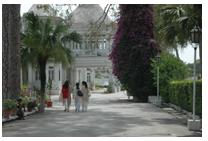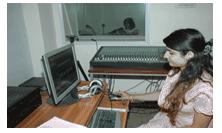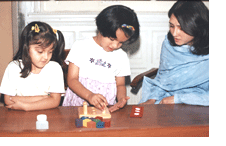Fatima Jinnah Women University (Pakistan)

Fatimah Jinnah Women University in Rawalpindi was founded in 1998 as the first women’s university in Pakistan. It was named for Dr. Fatima Jinnah, a leading figure in the Pakistani independence movement from Britain commonly referred to as the Mother of the Nation, in honor of her contributions to female emancipation. The university has grown quickly with 14 undergraduate and master’s departments and seven research centers. A satellite campus is also being constructed in Sialkot. FJWU’s website>>
Student Volunteering
 FJWU requires its students to complete a minimum of 20 hours of volunteer work in the community. Students are involved in a wide range of voluntary projects, particularly in areas such as primary schools and children with disabilities, refugee centers, literacy of prisoners, day care centers, local hospitals, mentoring, aiding people with disabilities, development trusts, literacy and computer education, and raising awareness about social issues. Learn more>>
FJWU requires its students to complete a minimum of 20 hours of volunteer work in the community. Students are involved in a wide range of voluntary projects, particularly in areas such as primary schools and children with disabilities, refugee centers, literacy of prisoners, day care centers, local hospitals, mentoring, aiding people with disabilities, development trusts, literacy and computer education, and raising awareness about social issues. Learn more>>
Radio VOW 96.6
 The department of Communication Science collaborated with USAID and Internews International to establish FJWU campus Radio in 2006 to serve as a Community Radio provider. FJWU broadcasts five to six recorded informative programs on regular basis (mostly co-produced by the University students and the Radio Producers). Radio VOW FM 96.6Mhz carries news and information based programs towards a local area, particularly targetted at youth, students and women. Other than the regular progams, recorded programs for lectures, seminars, workshops and events are also organised. Learn more>>
The department of Communication Science collaborated with USAID and Internews International to establish FJWU campus Radio in 2006 to serve as a Community Radio provider. FJWU broadcasts five to six recorded informative programs on regular basis (mostly co-produced by the University students and the Radio Producers). Radio VOW FM 96.6Mhz carries news and information based programs towards a local area, particularly targetted at youth, students and women. Other than the regular progams, recorded programs for lectures, seminars, workshops and events are also organised. Learn more>>
Work in the Community at FJWU
 Several of the academic departments require their students to work with the community. Students majoring in behavior sciences, such as anthropology, psychology, and sociology, are required to do internships in various institutions, such as hospitals and psychiatric institutions, providing counseling, personality assessment, and psychotherapy. Students in these majors have also worked as Research assistants for different projects in various Governmental and Non-Governmental Organizations. Thus, these students not only gain real-life experience that help them in the job market, but also provide a valuable service to society, particularly to vulnerable communities. Learn more>>
Several of the academic departments require their students to work with the community. Students majoring in behavior sciences, such as anthropology, psychology, and sociology, are required to do internships in various institutions, such as hospitals and psychiatric institutions, providing counseling, personality assessment, and psychotherapy. Students in these majors have also worked as Research assistants for different projects in various Governmental and Non-Governmental Organizations. Thus, these students not only gain real-life experience that help them in the job market, but also provide a valuable service to society, particularly to vulnerable communities. Learn more>>
 The Education Department also sensitizes its students to the realities and constraints of a developing country, using a field-based approach. It focuses on aspects of national/international education including curriculum practices. It gives them opportunities to become both reflective practitioners and critical thinkers through an analysis of significant and critical issues of Education in Pakistan. The community work required by the program enables the students to work in the communities for enhancing their comparative understanding and appreciation of the community issues. Learn more>>
The Education Department also sensitizes its students to the realities and constraints of a developing country, using a field-based approach. It focuses on aspects of national/international education including curriculum practices. It gives them opportunities to become both reflective practitioners and critical thinkers through an analysis of significant and critical issues of Education in Pakistan. The community work required by the program enables the students to work in the communities for enhancing their comparative understanding and appreciation of the community issues. Learn more>>